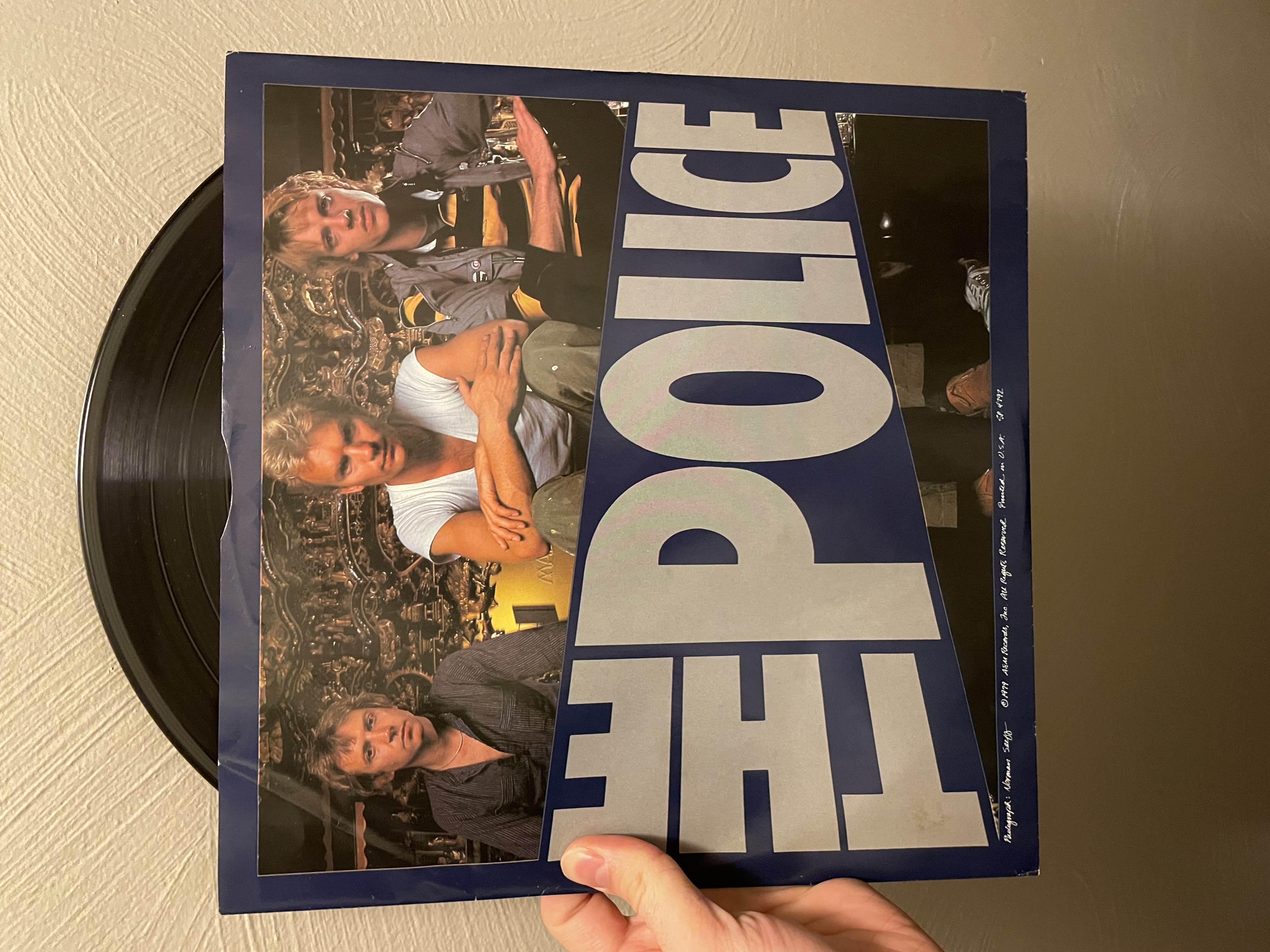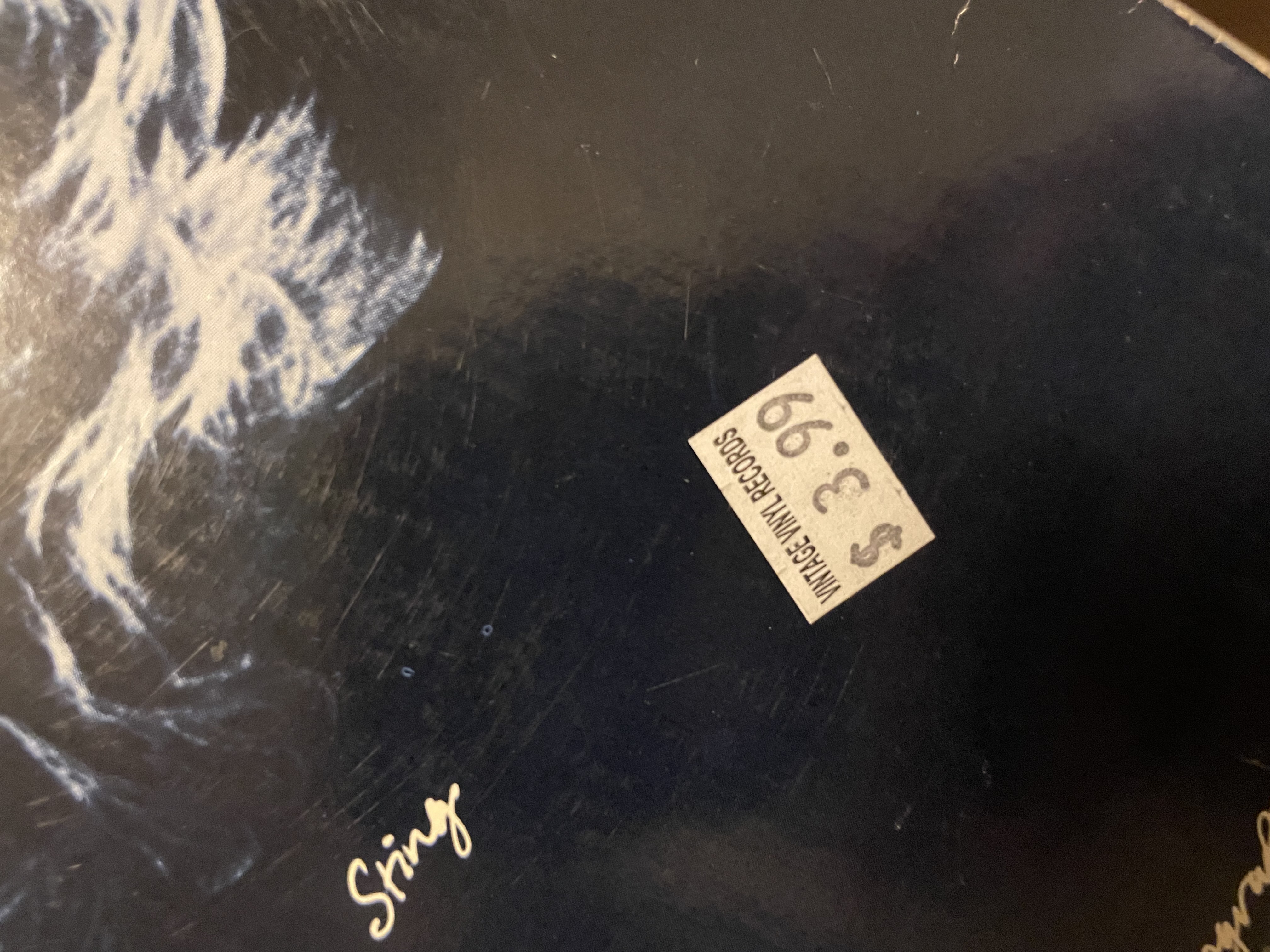
Be Sure to Wear Flowers in Your Hair
Published on Jan 19, 2026
WALK OUT TO WINTER: falling in love with—and to—Aztec Camera's High Land, Hard Rain
Published on Dec 26, 2025
First Anniversary
Published on Dec 17, 2025
Introducing: The IHTOV Zine
Published on Dec 15, 2025
More Liner Notes…
Featured Essay: In Defense of The Police (the band)
by Draven Marino

The first record I ever bought myself was a copy of The Police’s Reggatta de Blanc. I purchased it on a trip to my home state of New Jersey in 2015; I was 15 years old. I can authoritatively date this purchase because I felt compelled to post the purchase on my Instagram. At the time, if you asked me to pick any tour to see, I would have considered saying a show on the Outlandos D’Amour tour.
Fast forward almost a decade later to 2025: I still love The Police. I own all their records on various physical formats; As of writing this, I just spun my Zenyatta Mondatta vinyl about a week ago while I made dinner. To this day, I still think Stewart Copeland is one of the greatest to ever do it (argue with a wall).
Those are some of my fan credentials, qualifying me (in my own mind) to discuss the band in this way. So now, naturally, I will detail my major gripe surrounding The Police. While I have no hard data to back this up, anecdotally, I have personally seen many instances of The Police being slammed online. People like to call The Police (and The Doors, but that is a conversation for another day) terrible; not as rage bait or to generate discourse, but as a tepid, throwaway sentiment, which I almost find more frustrating! They treat it as if it is as true as water being wet, as the Earth orbiting the sun. To some, it is simply an unremarkable fact of life that The Police are terrible, not even worth discussing further. I resent this sentiment.
Reggatta is not my favorite album of The Police’s (that distinction goes to the previously mentioned Outlandos), but it is firmly in the top three, the upper echelon of Sting, Andy Summers, and Stewart Copeland’s reggae-indebted brand of new wavey pop. And while I could see how, even in concept, three white British guys doing a “reggae-indebted brand of new wavey pop” may cause many to physically recoil (while also doing nothing to sell the uninitiated on giving the band a try) I will still go to bat for them for one reason: They wrote good fucking songs.
In pitching this to the editor/creator of I Have That on Vinyl, she gave me an interesting perspective on this topic:
“Funny story, I got reamed on Twitter a few months ago for saying The Police are a band to be listened to on a greatest hits comp. I say this as a person who owns all their records, too!”
This got me thinking: Given how many radio hits The Police had in their heyday, how many people who weren’t there to see their reign received their first (and maybe only) exposure to the band via greatest hits compilations?

Don’t get me wrong, I love the hits; they’re hits for a reason (for the most part)! Growing up, I know my first exposure to The Police was the 1995 greatest hits compilation, Every Breath You Take: The Classics. But to be frank, I wouldn’t write an essay about most any band for their hits, with the exception of Foo Fighters (who I have unilaterally given the distinction of having the “greatest greatest hits album of all time”). Personally, I believe why The Police are so profoundly interesting and worth defending is because of their deep cuts, which include more experimental swings, as well as their ability to curate distinct atmospheres and tones on their albums. And so, to illustrate my point, I will be using my first self-purchased record, Reggatta, as an example.
But first, I want to examine the physical context of the album’s format: It is split into an A and B side (as records tend to be!), with the first side containing the run from “Message in a Bottle” to “Deathwish,” while the second side covers “Walking on the Moon,” onward. Interestingly, the big hits open each side, and I don’t think this is a coincidence given that they were both singles. But what is even more fascinating is how the rest of each side plays out: While all (or at least most) of the tracks still are clearly The Police songs, containing many of the hallmarks of their sound, they also all stand out from the two side openers for some reason or another. These quirks range from minute details, like the vocal processing on “No Time This Time,” to larger subversions of standard fare, by incorporating “darker” lyrical themes or strange vocals (“Bring On the Night,” “On Any Other Day”). Spinning my copy for the first time in a while, with writing this article in mind, I found myself paying attention to this much more than I ever had before.
As I mentioned, the “Every Breath You Take” comp was my first exposure to The Police. However, only two songs from Reggatta appear across its 14 tracks: “Message In A Bottle” and “Walking On The Moon.” (Three, if you count the second version of “Message In A Bottle” that closes the compilation).
If you heard these two songs, the former an upbeat, groovy pop track and the latter a more spacious and downtempo piece, you might come to mistakenly believe you’ve seen the two sides of The Police. After all, these two vibes do appear in a lot of the other hits too.
But there’s a lot more to find than the hits on Reggatta, not to mention all their other records.
The album opens with “Message In A Bottle,” and understandably so; It rips! But would you believe me if I told you that the title track, which immediately follows it, is a mostly instrumental piece, only interrupted by repeated vocalizations that include, “Rio Rio Rioyo” and “Ay ay ay ay”? Well, it does, and it is pitch perfect, allowing the instrumental work to shine, with a great uptempo change towards the end to get the energy up. In many ways, this track boils down what I mean about what makes the band interesting: during an era of physical albums, where to take swings was a bigger risk that could make or break your sales, these guys were not averse to throwing a strange, potentially-alienating curveball at you. And of course, it helped that said curveballs would often land due largely to the remarkable musicianship of the band’s three members. (In this specific case, they would be greatly rewarded for this move, with a Grammy Award for Best Rock Instrumental Performance in 1981).
The next outlying track I want to note is “Bring On The Night,” which has always been one of my favorite tracks from their discography. Sting’s lyrical choices here are haunting, the verses set against a dizzying plucked guitar melody from Andy Summers. With a refrain that is simply, “Bring on the night/I couldn’t stand another hour of daylight,” The Police have no business making something so haunting so catchy. Interestingly, this track was actually a single (in the U.S., France, and Germany, after the release of Reggatta), along with, “Message In A Bottle,” and “Walking On The Moon.” While the latter two would chart well in the UK, and go on to be two of The Police’s signature hits (with “Message In A Bottle,” even cracking the Billboard Hot 100 at the time), “Bring On The Night,” would fail to chart in the U.S. and Germany altogether, only charting in France. And not to be contrarian, but I firmly believe that “Bring On The Night” is the best song of the three.
The final track from Reggatta that illustrates my thesis is “On Any Other Day.” Helmed by Stewart Copeland on lead vocals and songwriting duties (which if you are familiar with this band’s lore, this is remarkable given Sting’s tyrannical control over most of the songwriting), this track is a far cry from standard fare for The Police. It came out in 1979, but has a chorus with a proto-pop punk sensibility, and dry, sardonic lyrics that must have sounded out of place in the mainstream pop rock of the time. I can’t imagine that anyone who bought the record on the strength of “Message In A Bottle” or “Walking On The Moon” back then wasn’t taken aback by this song specifically.
If you’re reading this, and are quick to lampoon The Police because you find “Roxanne” irritating, or “Don’t Stand So Close To Me” lyrically off putting, I implore you to give the aforementioned three tracks a try. These tracks are a far cry from “signature” songs for the band, and you’ll be hard pressed to find anything like them even today. That alone is worth merit, in my opinion. And despite all this, they are sorely absent from most of the five compilation records on Apple Music (“Reggatta De Blanc” and “Bring On The Night” appear on the aptly-titled, if not a bit on-the-nose 2007 comp, The Police [Remastered]).

So, if up to this point, your primary exposure to The Police has been greatest hits albums or the odd radio run-in, I encourage you to give some of the deep cuts a chance. Sting, for all his insufferable qualities, is a hell of a songwriter, and the importance of the contributions of Andy Summers and Stewart Copeland are some of the best examples of complimentary, nuanced playing in mainstream pop and rock music history. The Police’s general sound would have had a much lower ceiling in less capable hands, and I think that is affirmed by their distinct and fairly consistent discography.
I recently parted with 35 or so records from my little collection, as they just didn’t reflect my taste anymore (and I wanted some extra money to sink into new ones!); that copy of Reggatta De Blanc was not one of those records, and likely never will be.
Draven Marino is a Pittsburgh resident who loves exploring all genres of music, especially more niche subgenres. Especially fond of harsh noise, jangle pop, and MJ Lenderman. Creates harsh noise/experimental music/whatever else I feel like as Clear Eyes, Full Heart.
I Have That on Vinyl is a reader supported publication. If you enjoy what’s going on here please consider donating to the site’s writer fund: venmo // paypal

